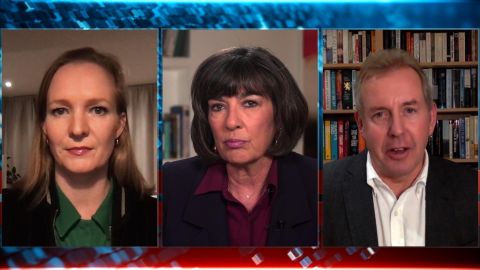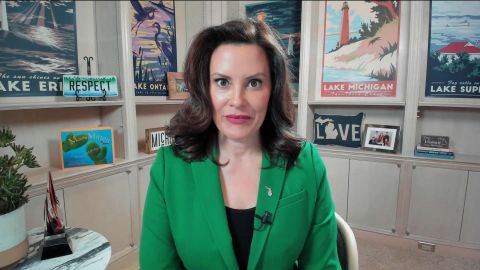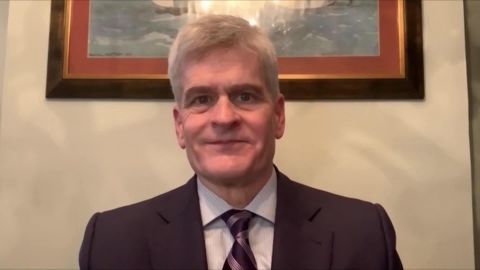Read Transcript EXPAND
CHRISTIANE AMANPOUR: Now, the Republican Senator Bill Cassidy of Louisiana was also in the Capitol yesterday. Of course, he has stood up against his colleagues efforts to block the routine certification of Joe Biden’s election as President, and he’s been speaking to our Walter Isaacson about what happened when Trump’s radical mob, including white supremacists, anarchists and anti-Semites stormed the citadel of American democracy.
(BEGIN VIDEOTAPE)
WALTER ISAACSON: Thank you, Christiane and Senator Bill Cassidy. Welcome to the show.
SEN. BILL CASSIDY (R-LA): And Walter, thanks for having me.
ISAACSON: That was a quite a night last night. Tell me what happened when the interruption happened. Where were you? Where did you go?
CASSIDY: Yes, so I’m sitting in the Senate chamber. I’m listening to James Lankford, the Senator from Oklahoma. And you look down, you just kind of look down, I’m taking notes. I just like to take notes. And all of a sudden Romney walks past me very quickly muttering something and just obviously upset heading for the cloakroom. And I look up, and Pence is gone. And, you know, how a scene changes, but it seems like it changes too quickly. I look up and like Pence is gone. And then I hear somebody say they breached the Capitol, and the shots been fired. And everybody begins to rust. And some folks begin to evacuate. The sergeant-of-arms goes up there and says there are protesters in the Capitol. They have breached security. Everybody sits down. Well, you know, you don’t really sit down, you look for something to swing in case somebody comes at you. But still, people were, you know, bang. They bring it all the staffers who are outside of the chamber for security purposes, and the press gallery. If you’ve ever seen Mr. Smith goes to Washington, does a press gallery just directly above the Dyess and he turns around and says bolt that door and the dress goes up and bolts the door. They say stay away from the doors, which tells me that they think there’s guns and that they may shoot through the doors. Now, we don’t know anything at this point. And the sergeant-of-arms says that. At some point it becomes clear that the force of the protesters is overwhelming the Capitol Police and they take us out of the chamber. As I leave, I look down the hallway and I see protesters down the hallway police between us. As I go further down, there’s a glass door, and they’ve moved a big piece of furniture in front of it to barricade the door. And there’s an officer, it looks as if he’s been injured. And you walk along, and you just get angrier and angrier. This is what happens in a third world country, is not what happens in the United States of America, where according to our Constitution, we do something, and people disrupted to keep it from happening. We came safely. Obviously, there was a show of force. But Walter and this was a tragedy for America.
ISAACSON: President Donald Trump sort of incited it that morning by saying going down, we’re going to go down the Capitol, we’re going to be strong. Do you think he’s largely to blame for this?
CASSIDY: We will review of what happened. But clearly the president encouraging activities, testing out that it would be wild on January the 6th. Brought some folks with expectations that this is what was OK to happen. And that’s why I tweeted asking the President to ask all the protesters to go home. With no qualification, no kind of justification, no, any sort of any sort of anything except go home. This is wrong, is criminal. Because the President can speak to those folks as no others with. And so yes, the President has a role in this. And that role will be thoroughly kind of figured out.
ISAACSON: You call them protests. But yesterday you said it was sedition.
CASSIDY: It was sedition, at least there’s some there who are just wonderful people who are exercising their First Amendment right, because there are thousands there. But those that broke into the Capitol and spoke a revolution. That is the definition of sedition. Disrupting a constitutionally ordered process is sedition, tearing up U.S. taxpayer property, vandalizing putting a person in a position where she got shot and she died. There’s a lot of criminal charges there and I hope every one of them, every one of them is fully enforced.
ISAACSON: Do you think it was somewhat doped by some of the senators who decided that they were going to do this unprecedented act of trying to object to the Electoral College vote?
CASSIDY: Unfortunately, the objections were not unprecedented. They’ve been previously done. Barbara Boxer, for example, a liberal senator from California, had done that to protest George W. Bush’s victory in the year 2000. In fact, every Republican president since 2000 has had his election protested over if not by both chambers, at least by one.
ISAACSON: But wasn’t this something different in the sense that it was intentionally provoked in order to overturn the election rather than just make a protest?
CASSIDY: So clearly, we couldn’t overturn the election. That was always kind of the subterfuge or lie, if you will, that was involved in this. The election was never going to be overturned, if only because Democrats control the House of Representatives. So, if you read what the senators on — what the senator said, it was not about overturning it was about an audit. There is a distinction there. Now, we can have different opinions. But frankly, that’s a separate issue. The separate — hat should not be used to justify the assault that took place in the Capitol. It was constitutionally allowed those senators to raise a protest. As I’ve mentioned, the precedent was in modern times was established in the year 2000 by Barbara Boxer. I still think it’s regrettable. I voted no, I made clear the — before I was going to vote no, because there was an expectation created that we could overturn the election, and that was not going to happen. So, it is their constitutional right to do it. There is a modern-day precedent to do it. I think given circumstances, it would have been wiser not to, but it was their right to do so.
ISAACSON: Should we change the process somehow?
CASSIDY: No. We should expect people to take the responsibility of great freedoms as understanding that with that comes the responsibility to exercise those freedoms appropriately. Our countries always give them the benefit of the doubt to freedom up at our best we do. But when those freedoms are abused, you put it risk the ability to exercise those freedoms for many others. So, I would say that we don’t have to change the process, we have to, as Americans, that within ourselves and accept we have great freedoms within that comes great responsibility to use those freedoms appropriately.
ISAACSON: Given President Trump’s behavior of inciting this mob that went down to the capitol and what he did with the Georgia secretary of state, are you worried about what could happen in the next 13 days? I mean, are we safe?
CASSIDY: I think the president should be worried. And know I’m just — this is not Bill Cassidy. This is Bill Cassidy reporting what other people say. Well, you know, others say. Oh, we can’t impeach, because we don’t have enough time. You’re thinking of impeaching a guy with only two weeks left. That Vice President Pence should get eight cabinet members and invoke the 25th Amendment. So, the fact that people are actively discussing this I think should be a warning to the president. Frankly, I think he’s taking that warning. The headline I read this morning was that he is going to accept a peaceful transition of power. That is actually contrite note. But I do think that there are people on both parties who are very concerned, so concerned about what happened that there are realistic conversations about what I just described.
ISAACSON: Tell me more about those conversations.
CASSIDY: I can’t say I’m a party to them, I’m just hearing them spoken of, so I can’t give you more detail than that, but there is a concern. Whenever protesters break into a Nation’s Capital and attempt to disrupt a constitutional process and speak of revolution, again, it’s something that you would see in a Banana Republic. It is not something we are supposed to see in the United States capitol. And to that purpose, these conversations were held, to make sure this does not happen in the next two weeks. Again, I think that is a warning to the president as to the seriousness as to how this is being viewed.
ISAACSON: The statement this morning was not sent directly by President Trump but was sent in his name. We’ve seen the president change his mind, let’s say. So, is there any contingency in your mind if later today, tomorrow, the next day, he gets back on Twitter or some other place and starts encouraging people to come down and — to the capitol again?
CASSIDY: Well, practically speaking, if he does that, Twitter will take him off. It’s four strikes and you’re out, from what I read. If it happens, he’ll be permanently banned from Twitter. So, just practically speaking. But as I mentioned, there are people who are so concerned about this, about this assault upon our democratic institutions, that they are encouraging Vice President Pence to invoke the 25th Amendment, which is so regrettable. The president had a legacy of an incredible economy that brought record low unemployment for people who have been dispossessed, a prosperity that had not been seen among African Americans, Hispanics, the disabled, the high school dropouts. We really reversed a lot of trends with a great economy, and I could go down the list of accomplishments. As a physician, I like the fact that now hospitals have to publish their prices, drug prices are lower. That could have been the legacy. Unfortunately, the first page in Wikipedia will be about this.
ISAACSON: Do you think that the president bears some responsibility for what happened yesterday? And in your own mind, should that be a reason to think about invoking the 25th Amendment?
CASSIDY: Chaplain Barry Black gave a prayer at the end of the joint session in which he speaks about how words can uplift, or words can hurt. Now, I’m kind of paraphrasing because I’m getting a little — you know, there have been some hours that have transpired, but words can uplift, or words can hurt or words can incite. So, to the degree that someone with an incredibly powerful voice, who has done a lot of good, so he’s got a lot of people invested in what he says, pushes an idea that clearly, clearly can have an effect. Clearly did have an effect. Now — but you asked the second part of that question, which is whether or not that would be grounds for the 25th Amendment. Again, under our constitution, that would be the vice president and the eight cabinet secretaries that would agree to that, that would make that determination. I really think it depends upon what happens over the next two weeks.
ISAACSON: But in your mind, is that a discussion they should be having and we all should be having now?
CASSIDY: Events reveal themselves. The president, as we mentioned earlier, this morning said that he conceded the election and that he would agree to a peaceful transition. If Pence and the eight cabinet secretaries are speaking among themselves, I frankly can imagine that, and I think the president could imagine that. Whether or not it’s happening, I suspect the president understands that it can be happening. So, I think we’ll see the president’s behavior tempered in light of that understanding.
ISAACSON: And if not?
CASSIDY: Well, if it’s not tempered, we’ll see if it really is taking place, whether Pence is actually talking to these folks and whether or not they would exercise the 25th Amendment.
ISAACSON: This week there was a somewhat surprising results in Georgia, in which two Democrats were elected to the Senate, which makes it a 50-50 Senate. Do you think that Trump’s behavior and his way of reacting to the election helped cause the defeat of the Republican candidates in Georgia?
CASSIDY: I’m told the polling data shows that when Josh Hawley began his – – a senator from Missouri — began to make an issue of the election results and the president began to speak to it, that the poll results began to worsen for Republicans. So again, I’m a physician. I prefer data as opposed to opinions. So, the best thing we have in terms of data is that when Hawley raised this and the president kind of reinforced it, our numbers began to go down. And you can see that turnout in traditional Democratic areas really popped, and turnout in traditional Republican areas began to decrease. That’s why we lost. And only lost by a small percent of the vote. So, it’s easy to imagine that, indeed, both Hawley and the president’s statements contributed to the defeat of the Republicans.
ISAACSON: What do you say to our Louisiana colleagues, Steve Scalise, John Kennedy, who were central to the efforts of trying to overturn the election, and you know, in some ways, provoke what happened yesterday? What do you say to other people in the Louisiana delegation?
CASSIDY: First, I’m not going to accept that they necessarily provoked. I think I mentioned earlier, I think it’s a separate issue that senators and representatives using a constitutional right could be used as an excuse for people who broke into the capitol. And I also don’t pretend to speak for other people. You know, I’m old enough, got enough gray hair, that I’ve learned that unless it’s egregious, you don’t really know what’s going on in someone’s mind with their rationale. All I can do is speak for myself. And when I saw the dozens and dozens of lawsuits alleging impropriety have been thrown out by over 90 judges, many of whom were appointed by Donald Trump, and all of whom found absolutely no basis for the lawsuits, that told me that if I believe in courts of law and rule of law, then there was not a case to be made. I can’t speak for them. I can only speak for myself.
ISAACSON: But what would you say to Steve Scalise and John Kennedy now?
CASSIDY: Well, I respect them greatly. I have no doubt that they have processed this, and they have some way in which they are addressing the situation. But, Walter, again, I’m not — two people who I have as much respect of as those two, I can’t pretend to give advice that would be better than that which they come to on their own. Again, I can just speak for myself.
ISAACSON: With the Senate now very closely divided, Democrats having a small edge in controlling the Senate, do you think that people like yourself, who have worked with Democrats as well as Republicans, put together coalitions, and even did so on the electoral challenge, came together with Democrats and Republicans to say this challenge is a bad idea, will be able to form a coalition that helps control the Senate in a more sensible way?
CASSIDY: It had better. We’ve got Social Security and Medicare going bankrupt. Medicare in four years. I’m a doctor. All the patients who depend upon Medicare and the trust fund will go bankrupt in four years. We’ve got to preserve those benefits for those who want it, strengthen it for those who are going to be. And that’s going to take both parties coming together I mean, by the way, Democrats control everything now. So, they can’t pass things through the Senate easily without Republican support. But nonetheless, they control everything. So, if I wanted to get conservative ideas in that I think make it better for the patient and better for Medicare’s trust fund and better for our country, then I, by golly, better work with somebody, because otherwise, I have no voice.
ISAACSON: Senator Bill Cassidy, thank you so much for joining us.
CASSIDY: Thank you, Walter.
About This Episode EXPAND
Gretchen Whitmer; Sen. Bill Cassidy; Kim Darroch and Marietje Schaake
LEARN MORE


